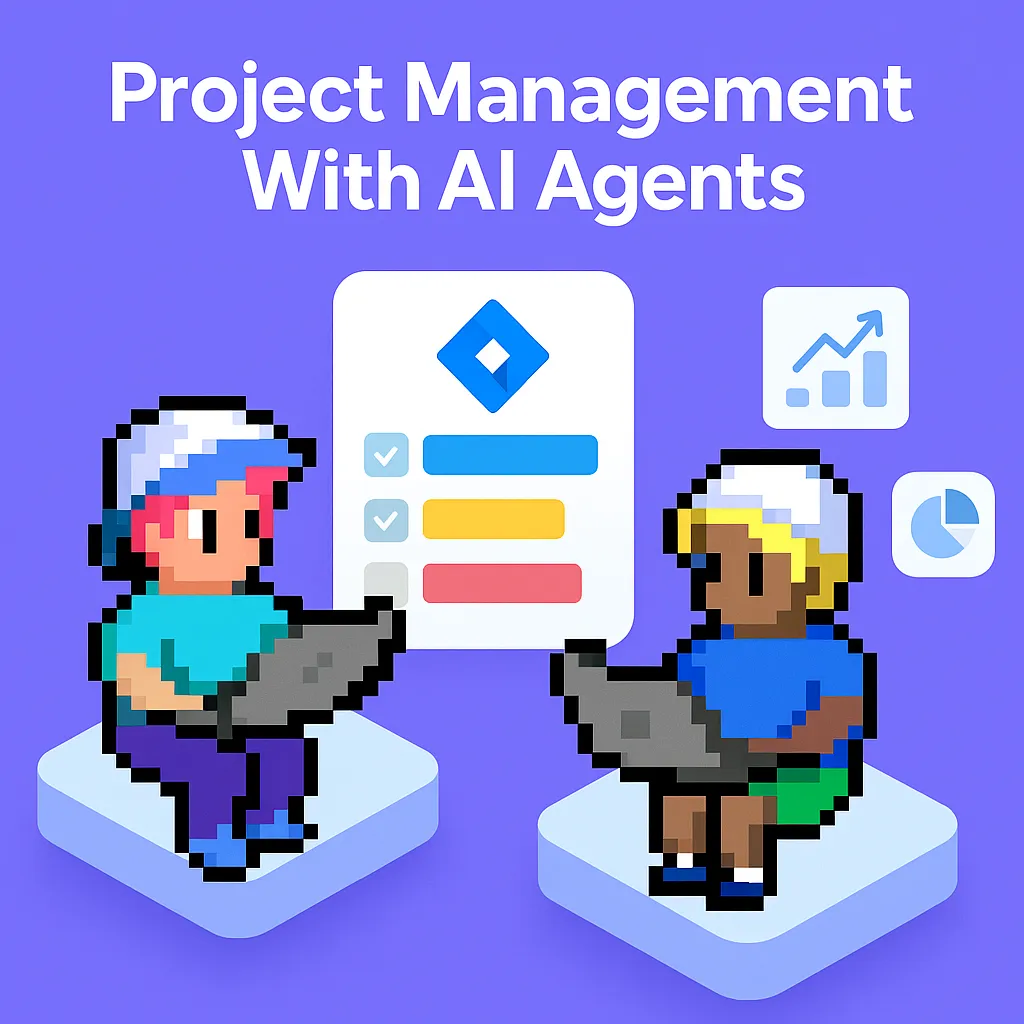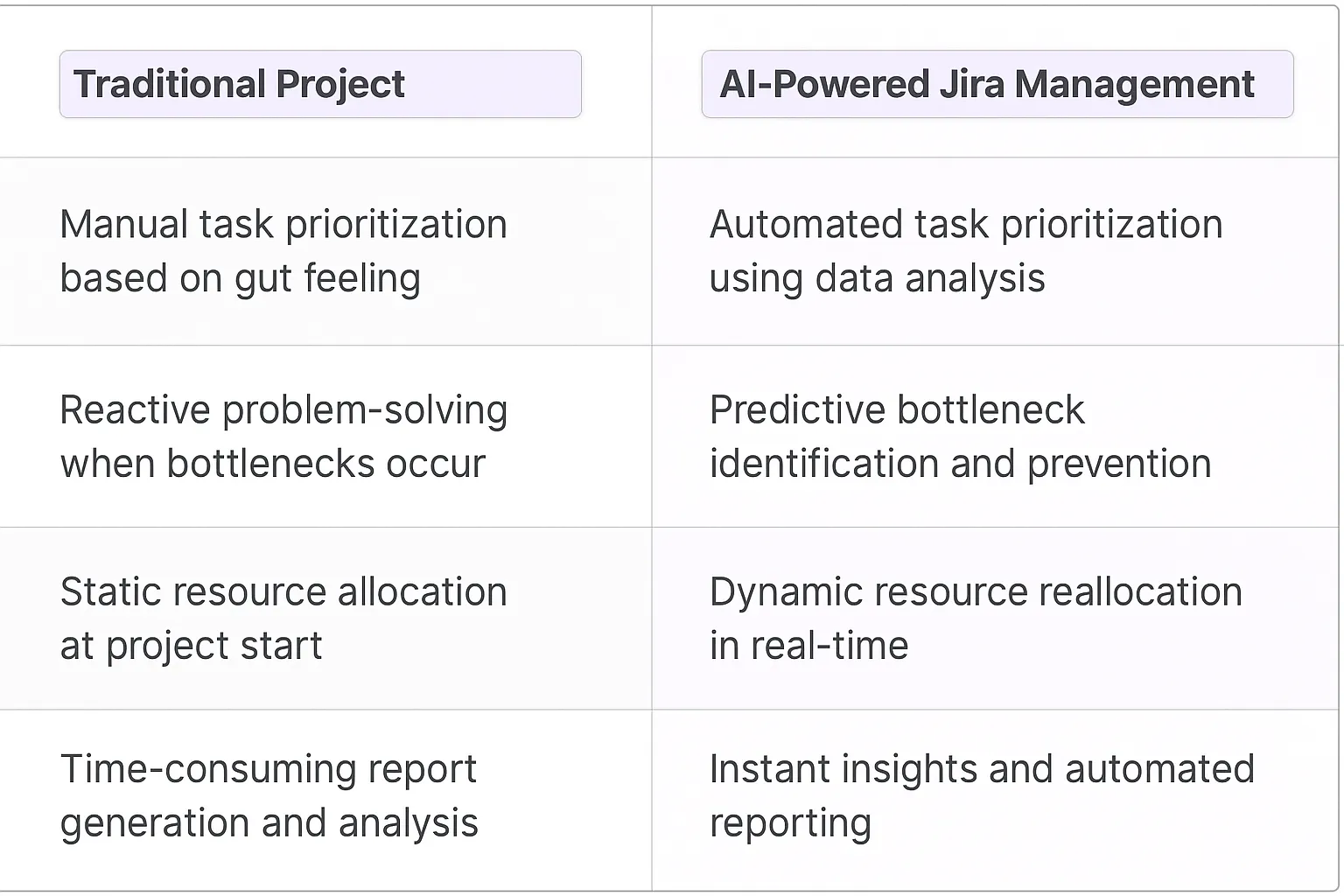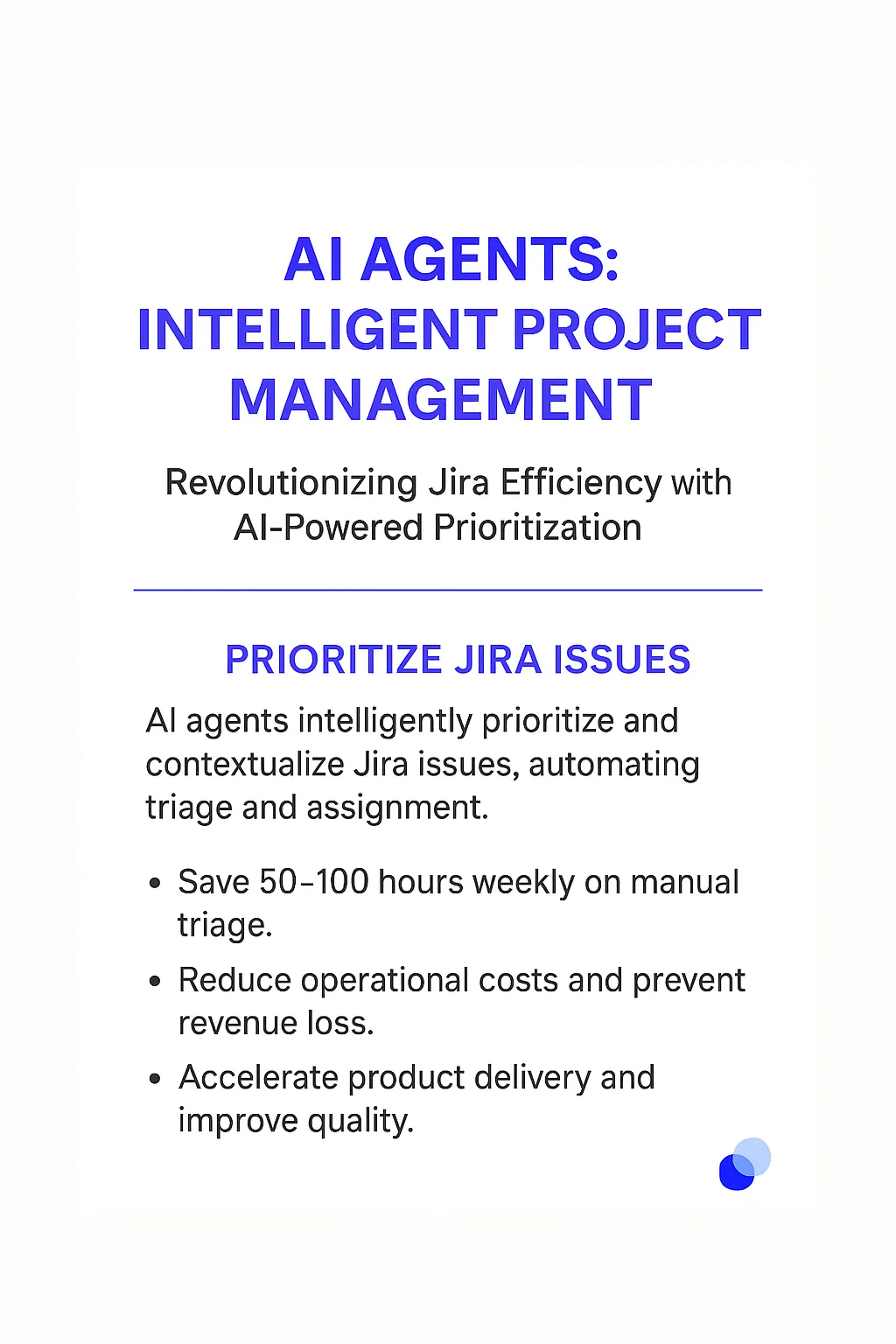Jira AI Agents
Understanding Jira: A Powerful Project Management Tool
Jira is a powerful project management and issue tracking tool developed by Atlassian. It's the go-to solution for teams looking to plan, track, and ship software efficiently. Jira's flexibility allows it to adapt to various workflows, from agile software development to traditional project management. At its core, Jira provides a centralized platform for teams to collaborate, prioritize tasks, and monitor progress in real-time.
Key Features of Jira
Jira's strength lies in its versatility and robust feature set. Some key features include:1. Customizable workflows: Tailor processes to fit your team's unique needs.2. Agile boards: Visualize work with Scrum and Kanban boards.3. Advanced reporting: Gain insights with burndown charts, velocity reports, and more.4. Issue tracking: Create, assign, and track issues throughout their lifecycle.5. Integration capabilities: Connect with a wide array of development and collaboration tools.6. Roadmaps: Plan and communicate product strategy across teams.7. Automation: Streamline repetitive tasks with no-code automation rules.

Benefits of AI Agents for Jira
What would have been used before AI Agents?
Before AI agents entered the Jira ecosystem, teams relied on a mix of manual processes, static documentation, and basic automation rules. Project managers spent hours sifting through tickets, prioritizing tasks, and generating reports. Developers had to context-switch constantly, jumping between Jira, code repositories, and communication tools. The result? A fragmented workflow that felt more like digital busywork than actual productivity.
The old way was a classic case of tools shaping behavior, rather than empowering it. Teams adapted to Jira's limitations, creating workarounds and developing "Jira experts" who could navigate the labyrinth of custom fields and workflows. It was functional, but far from optimal.
What are the benefits of AI Agents?
Enter AI agents for Jira – they're not just another feature; they're a paradigm shift. These digital teammates bring a level of intelligence and adaptability that transforms how teams interact with Jira.
First off, AI agents act as a force multiplier for your existing processes. They can analyze ticket patterns, suggest optimal workflows, and even predict potential bottlenecks before they occur. This isn't just about saving time; it's about unlocking new levels of strategic thinking for your team.
But the real game-changer is in how AI agents personalize the Jira experience. They learn from each team member's behavior, adapting to individual work styles. A developer might get AI-powered code suggestions directly within their Jira tickets, while a product manager receives tailored insights on feature prioritization. It's like having a digital sherpa guiding each team member through their Jira journey.
Moreover, these AI agents break down the silos between Jira and other tools in your stack. They can pull relevant data from Git commits, Slack conversations, or customer feedback tools, contextualizing it within Jira. This creates a unified view of your project landscape, reducing cognitive load and enabling faster, more informed decision-making.
Perhaps most importantly, AI agents in Jira democratize expertise. No longer do you need a dedicated Jira guru to optimize your instance. The AI can suggest best practices, automate complex workflows, and even provide natural language interfaces for less technical team members. It's like giving every team member a decade of Jira experience overnight.
In essence, AI agents are turning Jira from a project management tool into a true collaboration amplifier. They're not replacing human creativity or decision-making; they're augmenting it, allowing teams to focus on high-value work while the AI handles the digital heavy lifting. This isn't just an incremental improvement – it's a step function change in how teams can leverage Jira to drive outcomes.

Potential Use Cases of AI Agents with Jira
Processes
AI agents in Jira are like having a seasoned project manager on steroids, but without the caffeine addiction. They're not just about automating mundane tasks; they're about elevating the entire project management game.
These digital teammates can analyze historical project data and predict potential bottlenecks before they happen. It's like having a crystal ball, but one that actually works. They can suggest optimal sprint planning based on team velocity and capacity, ensuring you're not overcommitting or underutilizing your resources.
But here's where it gets really interesting: AI agents can dynamically adjust project timelines and resource allocation in real-time. As new information comes in, they're constantly recalibrating, ensuring your project stays on track even when curveballs are thrown your way.
Tasks
On the task level, AI agents in Jira are like having a hyper-intelligent octopus, with tentacles reaching into every aspect of your workflow. They can automatically categorize and prioritize incoming issues based on urgency, impact, and alignment with project goals. It's like having a 24/7 triage nurse for your tasks.
These digital teammates can also suggest the most suitable team member for each task based on skills, workload, and past performance. It's like having a matchmaker for your tasks and team members, but one that actually understands the nuances of your project.
AI agents can even draft initial task descriptions and acceptance criteria based on similar past issues, giving your team a head start. And as tasks progress, they can provide real-time updates and flag potential delays or quality issues before they become problems.
But perhaps the most game-changing aspect is their ability to learn and improve over time. As these AI agents interact with your team and projects, they become more attuned to your specific workflows and challenges. It's like having a digital teammate that's constantly leveling up, without needing performance reviews or raises.
In the world of Jira, AI agents aren't just tools; they're catalysts for a new era of project management. They're not replacing human creativity and decision-making; they're amplifying it, allowing teams to focus on high-value work while the AI handles the heavy lifting of coordination and optimization.
As we move forward, the teams that can effectively leverage these AI capabilities in Jira will have a significant competitive advantage. They'll be able to move faster, adapt more quickly, and deliver more consistently than their peers. It's not just about doing things better; it's about fundamentally changing what's possible in project management.

Industry Use Cases
AI agents in Jira are like having a secret weapon in your project management arsenal. They're not just fancy add-ons; they're game-changers that can transform how teams operate across different sectors. Let's dive into some real-world scenarios where these digital teammates shine:
Software Development: AI agents can automatically prioritize bugs based on user impact, suggest optimal sprint allocations, and even predict potential bottlenecks before they occur. They're essentially your 24/7 project health monitor.
Marketing Campaigns: These agents can analyze past campaign performance data, recommend resource allocation, and even draft preliminary task descriptions for team members. It's like having a marketing strategist and project planner rolled into one.
Healthcare Administration: In hospital management, AI agents can help track patient-related tasks, prioritize urgent cases, and ensure compliance with healthcare regulations. They become an invaluable asset in managing the complex web of healthcare workflows.
Each of these use cases demonstrates how AI agents in Jira aren't just tools, but transformative forces that can reshape entire workflows. They're not replacing human creativity and decision-making; they're amplifying it, allowing teams to focus on high-value tasks while the AI handles the grunt work.
Software Development: Jira AI Agents as Code Review Powerhouses
Let's talk about how Jira AI Agents could transform the software development landscape. These digital teammates aren't just fancy ticket sorters; they're potential game-changers for code review processes.
Think about it: developers spend countless hours reviewing each other's code. It's crucial but time-consuming. Now, imagine a Jira AI Agent that's been trained on your codebase, best practices, and common pitfalls. This agent could pre-screen code submissions, flagging potential issues before human eyes ever see them.
Here's where it gets interesting: the AI doesn't just catch syntax errors. It could identify performance bottlenecks, security vulnerabilities, or even suggest optimizations based on patterns it's observed across your entire codebase. It's like having a senior developer who's memorized every line of code your team has ever written.
But the real power comes from integration. When a developer submits a pull request, the Jira AI Agent could automatically create subtasks for each potential issue it finds. It could assign these to the appropriate team members, set priorities based on the severity of the problem, and even suggest time estimates based on historical data.
This isn't about replacing human reviewers. It's about amplifying their capabilities. Developers can focus on the nuanced, creative aspects of code review, while the AI handles the grunt work. The result? Faster iterations, higher quality code, and developers who can spend more time building and less time bug-hunting.
The knock-on effects could be significant. With more efficient code reviews, release cycles could shorten. The reduced cognitive load on developers could lead to better job satisfaction and retention. And the consistent application of best practices could result in a more maintainable, scalable codebase over time.
Of course, there are challenges. Training the AI effectively, ensuring it stays up-to-date with evolving codebases and practices, and managing the human-AI interaction will be critical. But for teams willing to invest in this approach, the potential upside is enormous.
In the end, Jira AI Agents in software development aren't just about automation. They're about augmentation - enhancing human capabilities and freeing up brainpower for the complex problem-solving that drives innovation. And in an industry where talent is everything, that's a competitive advantage you can't ignore.
Project Management: Jira AI Agents as Strategic Resource Allocators
Let's dive into how Jira AI Agents could reshape project management. We're not talking about simple task assignment here - we're looking at AI that could fundamentally change how teams allocate resources and manage workloads.
Project managers often struggle with the complex dance of resource allocation. It's a multivariable problem involving skill sets, availability, project priorities, and individual workloads. Most PMs rely on gut feeling and experience, but what if we could augment that with data-driven insights?
Enter Jira AI Agents. These digital teammates could analyze historical project data, individual performance metrics, and current workloads to suggest optimal resource allocations. They'd consider factors like an individual's past performance on similar tasks, their current workload, project deadlines, and even team dynamics.
But here's where it gets interesting: these agents wouldn't just make static recommendations. They'd continuously learn and adapt. As projects progress, the AI would track actual vs. predicted performance, adjusting its models in real-time. It could flag potential bottlenecks before they happen, suggesting proactive resource shifts to keep projects on track.
The implications are profound. With AI handling the heavy lifting of resource allocation, project managers could focus on higher-level strategy and team leadership. They'd have more time for the human aspects of the job - mentoring team members, navigating office politics, and steering the overall direction of projects.
Moreover, this approach could lead to more equitable and efficient workload distribution. The AI wouldn't play favorites or fall prey to unconscious biases. It would simply optimize for project success and team well-being based on data.
Of course, there are challenges. The AI would need access to a lot of data to make informed decisions, raising privacy concerns. There's also the risk of over-optimization - sometimes, the "inefficient" choice of letting someone stretch their skills on a challenging task can lead to long-term growth.
But for organizations willing to navigate these challenges, the potential is enormous. Imagine projects that consistently come in on time and under budget. Teams that are challenged but not overwhelmed. Resources that are used to their full potential without burning out.
This isn't just about making project management more efficient. It's about unlocking human potential. By offloading the complex calculus of resource allocation to AI, we free up human minds to do what they do best - innovate, create, and lead.
In the world of project management, Jira AI Agents could be the difference between good and great. And in a business landscape where execution is everything, that's a difference that matters.
Considerations and Challenges in Implementing Jira AI Agents
Integrating AI agents into Jira isn't just a plug-and-play solution. It's a complex process that requires careful planning and execution. Let's dive into the nitty-gritty of what you'll need to consider and the hurdles you'll likely face.
Technical Challenges
First up, the tech stuff. Jira's API is robust, but it's not always a smooth ride. You'll need to grapple with rate limits, which can throttle your AI agent's performance during high-traffic periods. Authentication is another beast - OAuth 2.0 is the way to go, but setting it up correctly can be a pain.
Data synchronization is crucial. Your AI agent needs to stay in perfect sync with Jira's real-time updates. This means implementing efficient polling mechanisms or webhooks, which can be tricky to get right. And let's not forget about handling Jira's custom fields - they're great for flexibility but can be a nightmare for standardized AI processing.
Operational Challenges
On the ops side, you're looking at a whole different set of issues. Training your team to work alongside AI agents isn't trivial. There's often resistance to change, and you'll need to invest in solid change management strategies to get buy-in.
Data privacy is a big deal. Your Jira instance likely contains sensitive project information. Ensuring your AI agent doesn't become a security liability requires careful planning and potentially additional security measures.
Then there's the question of AI accuracy. Your digital teammates will make mistakes, and you need a system in place to catch and correct these errors before they cascade into bigger problems. This might mean implementing human-in-the-loop processes, which adds complexity to your workflows.
Cost Considerations
Let's talk money. AI isn't cheap. You're looking at ongoing costs for API calls, compute resources, and potentially third-party AI services. These can add up quickly, especially as your usage scales. You'll need to build a solid business case to justify these expenses.
There's also the hidden cost of maintenance. AI models need regular fine-tuning and updates to stay relevant and accurate. This requires dedicated resources and expertise, which might mean hiring new talent or upskilling your existing team.
Ethical Implications
Finally, don't overlook the ethical aspects. AI decision-making in project management can have real impacts on team dynamics and individual performance evaluations. You need to ensure your AI implementation is fair, transparent, and doesn't perpetuate biases.
Implementing AI agents in Jira is a journey, not a destination. It requires continuous iteration, learning, and adaptation. But for those who get it right, the payoff in terms of efficiency and insights can be substantial.
The Future of Work: AI Agents and Jira Revolutionizing Project Management
The integration of AI agents with Jira represents a paradigm shift in project management and software development. These digital teammates are not just tools; they're catalysts for transformation, enhancing human capabilities and driving unprecedented levels of efficiency and insight.
As we've explored, AI agents in Jira can revolutionize processes from code reviews to resource allocation, offering benefits that span across industries. They promise to free up human creativity by handling the heavy lifting of data analysis and routine decision-making.
However, this integration is not without its challenges. Technical hurdles, operational adjustments, cost considerations, and ethical implications all need careful navigation. The journey to successfully implementing AI agents in Jira requires a strategic approach, continuous learning, and a willingness to adapt.
Despite these challenges, the potential rewards are immense. Organizations that successfully harness the power of AI agents in Jira stand to gain a significant competitive edge. They'll be able to move faster, adapt more quickly, and deliver more consistently than their peers.
As we look to the future, it's clear that AI agents will play an increasingly crucial role in how we manage projects and develop software. The question is not if, but how quickly and effectively teams will adopt and adapt to this new paradigm. Those who embrace this change, navigating the challenges with foresight and flexibility, will be well-positioned to lead in their respective fields.
The fusion of AI and Jira is more than an evolution of project management tools - it's a revolution in how we approach work itself. As this technology continues to mature, we can expect even more innovative applications and transformative impacts across industries. The future of work is here, and it's powered by the synergy of human creativity and AI capabilities.













